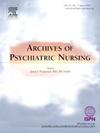青少年的童年创伤和分离症状:关于自我污名作用的纵向研究
IF 2.2
4区 医学
Q1 NURSING
引用次数: 0
摘要
解离症状是 ICD-11 和 DSM-5-TR 中都承认的精神现象,指的是一个人在整合其生物-心理-社会经历过程中的失败。虽然研究表明童年创伤与分离症状有关,但人们对童年创伤是否能预测分离症状的增加(即使是在短时间内)知之甚少。此外,哪些调节因素可能会影响这种关系,目前仍不清楚。本研究考察了童年创伤对随后出现的分离症状的影响,并探讨了心理健康相关自我污名的潜在调节作用。我们分析了国际青年样本(N = 146)的纵向调查数据。参与者在基线完成了童年创伤、自我污名和分离症状的标准化验证测量,并在大约三个月后再次报告了他们的分离症状。在基线时表现出病理性分离的参与者中,超过 75% 在随访时继续表现出病理性分离。即使在很短的时间内,基线童年创伤也与分离症状的增加有关。在控制了基线解离症状后,自我污名在很大程度上调节了基线童年创伤与后续解离症状之间的关系。这项研究证实,即使在三个月内,童年创伤也与分离症状的增加有关。我们还发现,自我烙印可能会加剧童年创伤对后续解离症状的影响。研究结果为预防和管理童年创伤幸存者的解离症状提供了启示,并为修正解离创伤模型提供了参考。本文章由计算机程序翻译,如有差异,请以英文原文为准。
Childhood trauma and dissociative symptoms among young adults: A longitudinal study of the role of self-stigma
Dissociative symptoms, which are psychiatric phenomena recognized in both ICD-11 and DSM-5-TR, refer to failures in the process of integrating one's biopsychosocial experiences. While research shows that childhood trauma is associated with dissociative symptoms, little is known about whether childhood trauma could predict increases in dissociative symptoms even within a short period of time. Additionally, it remains unclear what moderators may influence this relationship. This study examined the effects of childhood trauma on subsequent dissociative symptoms and explored the potential moderating effects of mental health-related self-stigma. We analyzed longitudinal survey data from an international sample of young adults (N = 146). Participants completed validated standardized measures of childhood trauma, self-stigma, and dissociative symptoms at baseline, and they reported their dissociative symptoms again after approximately three months. Over 75 % of participants with pathological dissociation at baseline continued to exhibit pathological dissociation at follow-up. Baseline childhood trauma was associated with increases in dissociative symptoms even within a short period of time. Self-stigma significantly moderated the relationship between baseline childhood trauma and subsequent dissociative symptoms, after controlling for baseline dissociative symptoms. This study confirmed that childhood trauma is associated with increases in dissociative symptoms even within three months. We also found that self-stigma may exacerbate the effects of childhood trauma on subsequent dissociative symptoms. The results provide insights into the prevention and management of dissociative symptoms in childhood trauma survivors and inform the modification of the trauma model of dissociation.
求助全文
通过发布文献求助,成功后即可免费获取论文全文。
去求助
来源期刊
CiteScore
3.70
自引率
0.00%
发文量
131
审稿时长
160 days
期刊介绍:
Archives of Psychiatric Nursing disseminates original, peer-reviewed research that is of interest to psychiatric and mental health care nurses. The field is considered in its broadest perspective, including theory, practice and research applications related to all ages, special populations, settings, and interdisciplinary collaborations in both the public and private sectors. Through critical study, expositions, and review of practice, Archives of Psychiatric Nursing is a medium for clinical scholarship to provide theoretical linkages among diverse areas of practice.

 求助内容:
求助内容: 应助结果提醒方式:
应助结果提醒方式:


